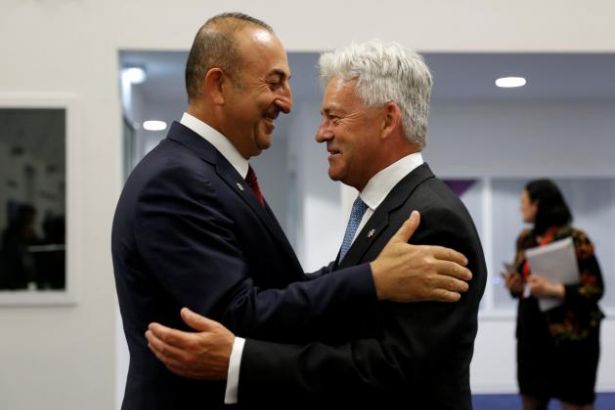EU foreign ministers meet for bargains with Turkey, Erdoğan sends positive signal

Meeting in Valletta, Malta, Turkish Foreign Minister Mevlüt Çavuşoğlu and his EU counterparts aimed to try to defuse a crisis in relations with a bargain.
President Recep Tayyip Erdoğan's loss of the referendum, in reality, gives EU imperialists to push Ankara for a more controllable Erdoğan. Erdoğan sent a signal on Friday that he open bargain with EU. He accused the EU of backing the "no" campaign in this month's referendum presidential system but insisted Turkey's door was open to reinvigorating battered ties with the bloc.
Before bargain starts Erdoğan feigned advantages, claimed that he won but EU lost:
"Okay, you (the EU) gave support for the 'no' campaign (in the referendum). You lost," he said at the Atlantic Council İstanbul summit.
"From now you close that chapter and put efforts into how you will develop your relations with Turkey. Although you carried out that campaign, we are opening our door," he added.
Also at the Atlantic Council İstanbul summit, Erdoğan's influential spokesman İbrahim Kalın emphasised Turkey wants "to keep EU membership as a strategic goal." "But it takes two to tango and if you will talk about partnership and trust it is a two-way street," he said.
German Foreign Minister Sigmar Gabriel said in Malta his government was "strictly against breaking off the accession talks.... It would be the completely wrong reaction." After a day of talks, he said the real issue was to ensure the bloc had a new, looser agreement to offer Turkey before ditching the EU accession process.
Since its launch in 2005, the entry process has "helped Turkey win" foreign investment and become the world's 15th largest economy, EU officials say. But talks have since stalled. "It does not improve things by cancelling something before we have something new to offer," Gabriel told reporters.
"We can try to open new channels for negotiations," he said, referring to an idea to broaden the European Union's trade ties with Turkey, giving Turkish companies greater tariff-free access to the bloc's 500 million citizens.
France's Jean-Marc Ayrault said the tone of the private meeting was more measured than ministers' public comments. "How can we ignore Turkey? We have to fight terrorism, we want Turkey to respect the migration deal with have," Ayrault said, referring to last year's agreement with Turkey to stop the flow of Syrian refugees to Europe in return for EU money. "Nobody wants a break-up with Turkey. It is up to them to say what they want," he said.
"There are so many areas where we need a correct, friendly and productive cooperation that we have to see, together with our Turkish colleagues, how we can improve the situation," said the European Union's enlargement chief, Johannes Hahn, who manages Turkey's membership bid and will attend the Malta meeting. "Let's keep a cool head and devise a package that enables us to work with Turkey," Hahn said, in a signal that the EU may downgrade ties with Ankara but seek to maintain a relationship based on trade and security cooperation.
"I would like to see a clear, courageous EU stand. 'Yes' to contact with Turkey. 'No' to accession," Austrian Foreign Minister Sebastian Kurz said.




